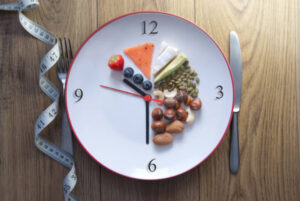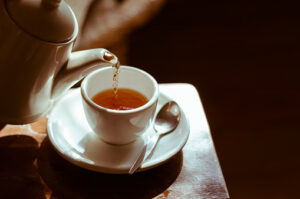Table of Contents
What is Intermittent Fasting? How To Fast With Tea
The goal of intermittent fasting is to inspire the body to metabolically switch, according to a 2019 study published in The New England Journal of Medicine.

This happens when the body flips a switch, of sorts, to use energy from ketones stored in fat instead of glucose that’s stored in the liver. Some scientists believe that this increase in ketones in the blood, called ketogenesis, might trigger cellular signals to slow down the rate of aging, reduce chronic inflammation within the body, and lead to more stable blood sugar.
What Is Intermittent Fasting?

Intermittent fasting is an eating pattern that involves alternating periods of fasting and eating. During the fasting phase, no food or beverages are ingested, except water, and there is no calorie intake. A normal calorie intake is restored during the eating session. Intermittent fasting can be done in a variety of ways, including
Time-Restricted Eating: Often considered the easiest of all intermittent fasting programs to follow, this often takes the shape of the 16:8 approach (fast for 16 hours and eat normally for the next eight hours) or the 14:10 method (fast for 14 hours and eat normally for the next ten hours).
Eat Stop Eat: Once or twice a week, fast for 24 hours. Eat normally on the other days.
Alternate-Day Fasting: Fast every other day for 500 calories, then eat normally on the other days.
5:2 Fasting: Eat normally five days a week and fast two non-consecutive days (for example, Monday and Wednesday).
The Warrior Diet: Pack all of your daily calorie requirements into a four-hour window.
Benefits Of Intermittent Fasting With Tea
Tea improves and simplifies intermittent fasting. Although you may be limiting the amount of time you can eat, you can always enjoy a cup of relaxing tea while on the diet. At Art of Tea, we feel that the benefits of fasting with tea are numerous, but the following are the most significant:
Feed Your Hunger: It may take a few days for your stomach to adjust to feeling lighter and not constantly digesting food while fasting. During these times, you will also begin to feel pretty hungry. We recommend that you feed your body tea. Green tea has been shown to reduce hunger and discomfort while fasting.
Feel Calm: Ginger and hibiscus teas are excellent for relaxing the spirit. These teas will boost your energy levels without leaving you jittery like caffeine in a cup of coffee. Instead, you can maintain your calm, mindfulness, and attention throughout your fast.
Help Your Body’s Health: Tea leaves contain polyphenols, a potent antioxidant that can aid in digestive health, brighter and cleaner skin, and improved attention. While any tea leaves can provide these advantages, we recommend green tea, ginger, and hibiscus for the best effects when practicing intermittent fasting.
Best Teas To Fast

Intermittent fasting with tea is all about learning how your body feels and how to deal with any discomfort. Finally, choose teas that you enjoy, are excellent for your body, and will help you get through the fasting period.
- Green tea
- Black tea
- Ginger tea
- Hibiscus Tea
Ginger tea can help calm an upset or uncomfortable stomach. It also has a wonderful, powerful flavor that aids in relaxing your emotions and mood. Hibiscus tea is excellent for relieving stress. We recommend sipping a cup of hibiscus tea before bedtime to refresh your mind and get a good night’s sleep. Green tea has long been used to aid in weight loss while also increasing energy levels. It can help you get through the hardest fasting times by making you feel full even when you haven’t eaten anything.
